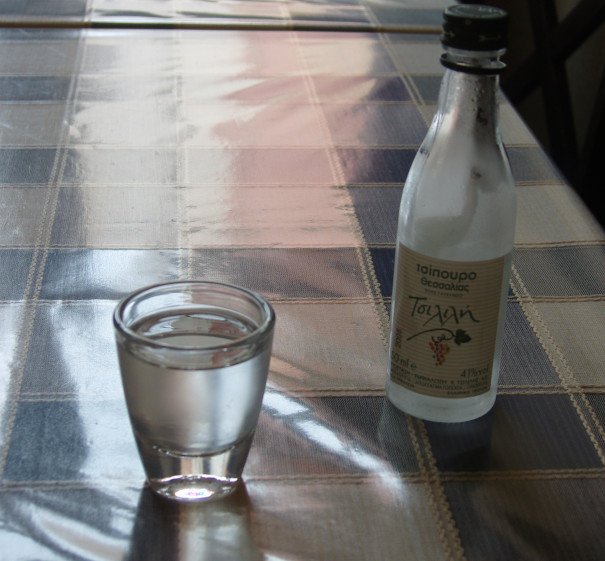
My Small Drunk Greek Breakfast

My Small Drunk Greek Breakfast
Tsipuro and Toursi in Ioannina
Yannis doesn’t speak any English and I don’t speak any Greek. This had been true the entire time I was staying at my friend Nikos’ house in Ioannina, but our linguistic differences had been bridged by a cushy buffer of translation and the fact that for most of the day, Yannis was churning out Marxist-Socialist theories at the university he worked at. Mornings thus far has been a solo cup of coffee before heading out of the house.
But this Saturday, Nikos had to run some errands with his mother. Did he want me to wake up his brother Stratis, who could act as a translator for me and his father? That seemed unfair; Stratis had come home late just a few hours prior, and besides, at this point in my life, I had eaten breakfast in stranger situations.
I dressed and headed downstairs, where Yannis was already sitting at the kitchen table with a bottle of tsipuro and a plate of toursi. Tsipuro is a 45 percent alcohol made from grapes. Toursi are pickles. Yannis makes both himself.
Did I mention it was no later than 10 am?
“Sarah!” Yannis said, his arms outstretched.
“Yanni!” I replied. “Kalimera!”
“Café?” he asked.
“Ne,” I said, nodding my head and taking a seat at the table.
Yannis mounded a spoonful of ground coffee into the espresso machine and sat next to me as the water sputtered. A minute of silence passed as we both tried to string together a sentence. He managed first.
“You … like Ioannina?” he asked.
“Ne,” I said. “Poli … um … poli …” I fluttered my hands around my face in what I hoped was a convincing mime of “your city is very beautiful and I very much enjoy the well-preserved historic artifacts!”
Yannis nodded gravely and handed me my coffee. I took a sip as I contemplated the fact that we had both exhausted our repertoire of the other person’s language and not five minutes had gone by. We sat quietly for a while longer as I drank my espresso, prolonging the time I was occupied and thus could not be expected to communicate.
We looked at each other and smiled, shrugging our shoulders as if to say “Welp, these next three hours should go by quickly.”
Yannis, being the older and more experienced of us, realized it actually wouldn’t without a bit of help. Which is how, at 10:30 am, I found myself being offered a shot of tsipuro on an empty stomach by a sixty-four-year-old political science professor.
Though tsipuro is the preferred beverage of choice in Ioannina, and Greeks do seem to drink it all day long, this seemed like a particularly early hour to start drinking. Still, when a Greek offers you a beverage, you must drink it: you’re sharing a moment, and it would be rude to refuse. Yannis ferments his own tsipuro in a plastic barrel in his basement. A framed portrait of a Lenin solemnly looks over the barrel.
“Yammas!” we cheered, clinking glasses. Yannis motioned with his fork at the glass dish of toursi.
Toursi is a traditional accompaniment to tsipuro. Yannis marinates a mix of chopped vegetables (carrots, tomatoes, onions) in olive oil, white wine vinegar and salt. The vegetables sit on the kitchen counter overnight; they pickle while retaining their crunch.
My first food of the day was a piece of carrot, which turned my mouth sour. I sipped my tsipuro, and reached for my notebook and pen. Breakfast was the perfect time to learn the Greek alphabet and teach the English one. Yannis and I sat huddled over the notebook for the next few hours, forking toursi and drinking tsipuro. We ran out of letters and graduated to household objects, pointing at a chair (karekla), an orange (portokali), the table (trapezi). I was nursing another coffee and learning the word for sofa (kanapes) when the door opened.
“All good?” Nikos asked.
Yannis and I looked at each other. “Poli kala,” I said, smiling. It was, after all, a very good breakfast.